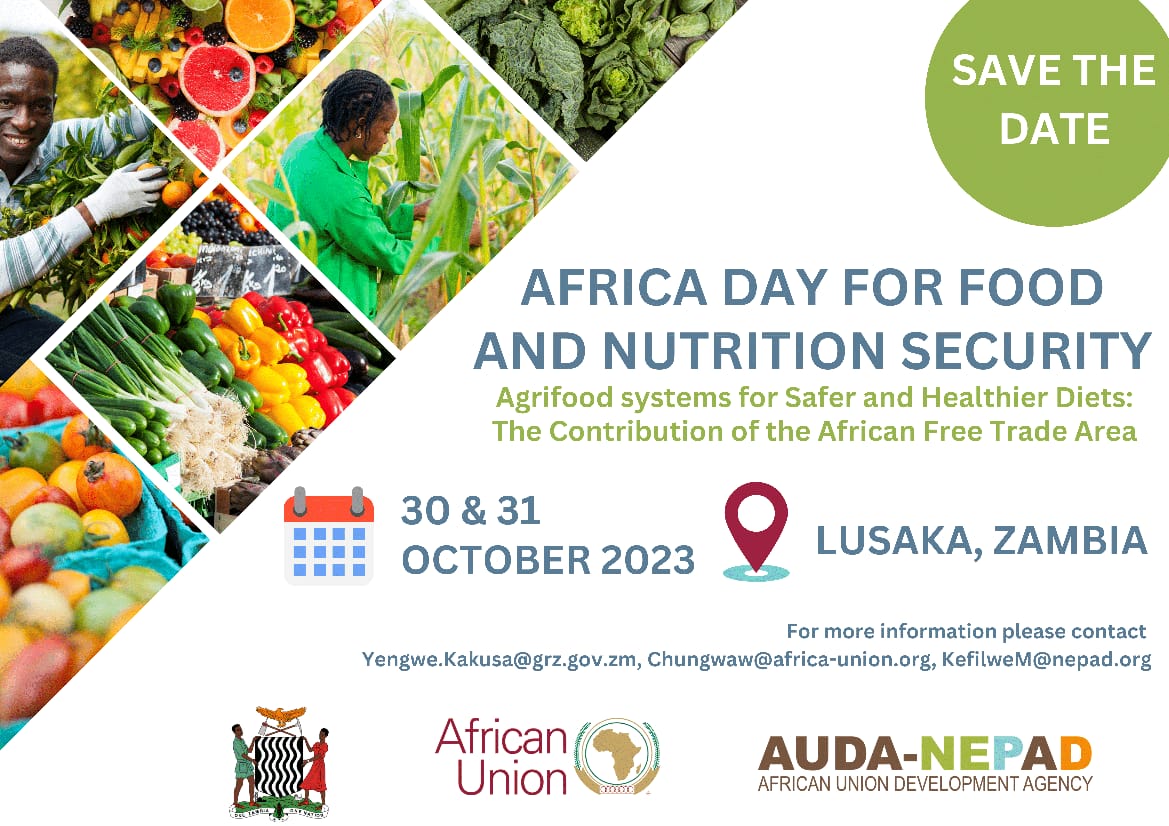|
Getting your Trinity Audio player ready…
|
Writes Baboloki Semele
Lusaka, Zambia, is set to become the focal point of significant events at the end of this month. The African Union Commission (AUC), in collaboration with various departments and partners and African Union Development Agency (AUDA-NEPAD) are organizing a series of important gatherings to commemorate the 14th Africa Day for Food and Nutrition Security (ADFNS), the 19th edition of the Comprehensive Africa Agriculture Development Programme (CAADP) Partnership Platform (PP), the Malabo Policy Learning Event (MAPLE), and the CAADP High-Level Ministerial Forum (HLMF).
Scheduled for October 30th to November 2nd, 2023, this groundbreaking event will operate under the theme “Accelerating the Implementation of the African Continental Free Trade Area Agreement in the Context of CAADP Commitments for Safer and Healthier Diets.”
The sub-themes encompass vital areas, including enhancing intra-African trade in agricultural commodities and nutrition improvement, leveraging science, innovation, and research for food and nutrition security, financing agri-food and nutrition through private sector involvement, and reflecting on 20 years of CAADP implementation.
A concept note shared with this publication reveals that these synchronized events aim to facilitate cross-fertilization of ideas, provide a platform for sharing experiences and lessons, and foster discussions on opportunities and strategies to boost intra-African agri-food trade and enhance nutrition across the continent.
Kicking off the week, the MAPLE event will enable stakeholders to exchange success stories, lessons, and best practices in agri-food and nutrition programming and policymaking. The combined CAADP PP & ADFNS High-Level Ministerial Forum will serve as a crucial platform for policy dialogue, essential for accelerating intra-regional food trade, enhancing food security, and stimulating economic growth across Africa.
Aligned with the 2023 AU Theme of “Accelerating implementation of the AfCFTA,” these events emphasize how increased movement of goods and services, along with strategic policy measures, can expedite the exchange of agri-food resources across African borders, thereby strengthening food security and enriching the continent’s nutrition profile.
This year’s CAADP PP, in conjunction with the ADFNS commemoration, will encourage evidence-backed reflections on 20 years of CAADP implementation and contribute to discussions on enhancing trade and nutrition. It will also shape the AUC and AUDA-NEPAD’s common narrative and direction, assess key lessons, and outline opportunities for joint action to expedite the CAADP implementation and inform the Post Malabo Agenda.
The concept note highlights that the 19th CAADP PP, organized in tandem with the 14th ADFNS commemoration, will not only assess progress in implementing the Malabo Commitments but also explore avenues to accelerate AfCFTA implementation. Insights from various stakeholders and existing evidence will be used to propel action towards the post-Malabo Agenda.
Regarding the ADFNS, which was declared in July 2010 by the African Union Heads of State and Government, the concept note underscores that it emerged in response to persistent food insecurity challenges, including chronic malnutrition in Africa. The initiative was born during a side event at the 15th Ordinary Session of the AU Summit in Uganda, where the rallying cry “Africa must feed itself, no child should go to bed hungry” echoed, leading to the establishment of a dedicated commemoration day to highlight the critical importance of food and nutrition security in Africa’s economic transformation agenda.
Since its inception in October 2010 in Lilongwe, Malawi, the ADFNS has been celebrated annually, hosted in successive years by Ethiopia, Niger, the Democratic Republic of Congo, Uganda, Ghana, Côte d’Ivoire, Tanzania, and Egypt. The COVID-19 pandemic compelled virtual editions in 2020 and 2021, with a hybrid event held in 2022, featuring both physical and virtual segments.
The overarching goal of the ADFNS is to garner political, technical, and financial commitments at all levels to address contemporary challenges in food and nutrition security interventions across Africa. It provides a platform for stakeholders at national, regional, and continental levels to share experiences, knowledge, and progress in ensuring the availability of quality food for the improved nutrition and health of all Africans.
